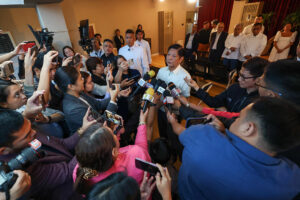
Our shortsightedness and skewed priorities
It is incredible but true that year after year, under presidency after presidency, the Land Transportation Office (LTO) runs out of drivers’ licenses and car plates before mid-year. Lack of government funding cannot be an excuse because licensees pay for these things. Surely, the motor vehicle industry makes projections on total sales for each year; and there must be some idea of how many licenses and car plates are needed each year. Doesn’t the LTO consult the industry?
It is also possible that we are the only country in the world where bedbugs and a rat have been videoed in the international airport! And flights had to be canceled for days because of technical problems due to poor maintenance!
Of course, it is common knowledge among Metro Manila commuters that the overhead trains are often on the blink because of poor maintenance and lack of spare parts!
Surely, there are enough professionals in our country who know how to plan beyond today, and to ensure facilities are working properly in the long term — but I guess they are in the private sector. Private business must think beyond the short term if they want to continue being a going concern. I am glad the main international airport is about to be privatized. It can help make our country more attractive to tourists and investors.
Perhaps if our bureaucrats were more prepared as managers rather than, for example, as lawyers, public services over the long term would be better provided.
The government has obtained Asian Development Bank help to fund the $4-billion, 32-kilometer bridge project between Cavite and Bataan. The objective is to reduce the distance between the already prosperous regions of Calabarzon, NCR, and Region 3. The Marcos Jr. government is prioritizing Build Better More as its development agenda.
The Cavite-Bataan Bridge is yet another investment meant to overcome the traffic problems of Metro Manila and its environs.
Meanwhile, the poverty incidence in our country has grown since 2021. As of 2023, almost 23% or almost one fourth of Philippine households are living below the poverty line. Most of the poor are in the southern regions of the Visayas and Mindanao.
What could we do with $4 billion, or over P220 billion, to reduce poverty incidence?
Well, we could provide more homes with running water. In many poverty-stricken areas, women must fetch water from distant sources, carrying heavy pails of water back home several times a day, a chore that can drain women’s energy. With the provision of running water, women could have more energy to do the sort of work that can add to family incomes.
We could also provide more irrigation for farms. Then farmers can produce more rice and other crops.
It is ironic that farmers and fishers, those who provide our food, are the poorest people in our country. They must be our top priority in development investment.
We are an archipelago. Fisheries deserve more focus. Currently it hardly contributes to the GDP.
Fishermen have to compete with large, motorized ships with huge nets that harvest the fish, including juveniles, from municipal waters. Many corrupt LGU politicians allow this to happen instead of enforcing laws that protect the coastal waters for small fishers. These small fishermen also need motors for their boats so they can go fishing in the deeper sea — where they face harassment by Chinese naval vessels in our oceans.
The Department of Agriculture is focused on production. But farmers are at the mercy of middlemen who can consolidate their produce for delivery and sale to urban markets. Perhaps if we refocus the Department of Agriculture towards agribusiness, they will look at post-harvest support. Tax incentives could encourage investment in warehouses and combine harvesters, for instance, which farmer-producers could rent out to earn more.
As is, the average age of farmers is already at senior level. This is a potentially serious problem that could threaten our ability to feed our families without importing food. The descendants of our farmers would rather work overseas rather than do the unprofitable grueling work that their parents do.
Is the President thinking about this? Does the Cabinet discuss these problems, potential and actual? What do our legislators consider in designing the National Government’s budget?
The Bishop of Negros Oriental has raised his objection to the planned merger of his province, together with Siquijor, into Negros Occidental. The lingua franca in Negros Oriental and Siquijor is Cebuano. Negros Occidental’s is Ilonggo. It is hard enough for the farmers and fishers of Negros Oriental and Siquijor to learn about opportunities and technologies now. Will the bureaucrats speak to them in Ilonggo or Cebuano? If Cebuano, how will the people of Negros Occidental respond? They are probably more comfortable being in the same region as Panay. Linguists classify Ilonggo and Cebuano as languages, not dialects. Wars have been fought and nations divided over language! Let us learn from history!
Teresa S. Abesamis is a former professor at the Asian Institute of Management and fellow of the Development Academy of the Philippines.



